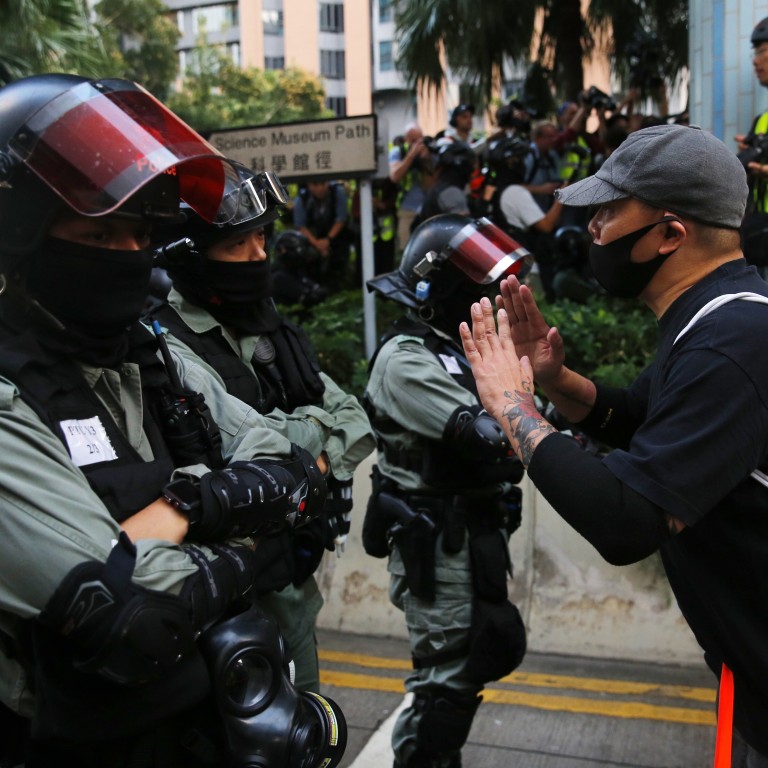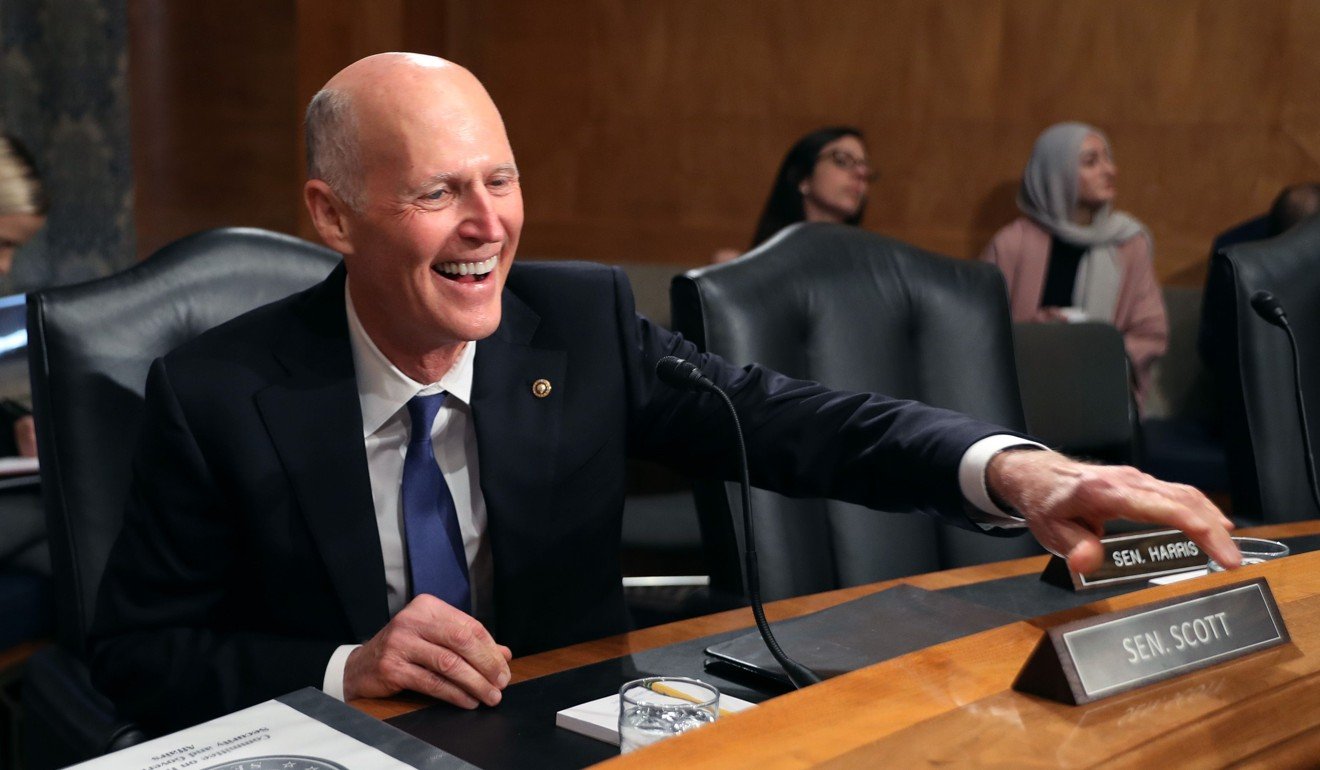
US lawmakers voice support for the message Hong Kong voters are sending to Beijing
- But President Donald Trump and his State Department remain silent on the pro-democracy candidates’ lopsided victory on Sunday
- ‘China take notice. The people are speaking,’ writes US Senator Josh Hawley
A landslide victory for Hong Kong’s pro-democracy candidates on Sunday reverberated in Washington with lawmakers from both parties cheering the results as the deadline approaches for US President Donald Trump to decide on a bill that paves the way for diplomatic action and economic sanctions against Hong Kong.
Messages on social media praised Hong Kong’s pan-democrats, who have supported a protest movement that has roiled the city for six months, and took swipes at China, which has dismissed the movement as an illegitimate plot supported by foreign governments.
“China take notice,” Senator Joshua Hawley, a Republican from Missouri, said in a Twitter post that linked to a tweet by Hong Kong activist Joshua Wong Chi-fung. “The people are speaking.”
In an op-ed in The Wall Street Journal on Sunday, Hawley argued that the US should “abandon the attempt to remake the world and focus on the threat from Beijing”.
“China has shown its desire for domination in Hong Kong, where it ruthlessly suppresses its own people and seeks to strip them of their liberties, including the protections of the rule of law,” Hawley wrote.
On Sunday, Hong Kong’s pro-democracy camp won control of 17 out of 18 local district councils. The council members will control 117 votes in the 1,200-member committee in electing Hong Kong’s next chief executive.
Neither Trump nor the US State Department released any statement on the election results.
Trump set to have final say on Hong Kong democracy act
Representative Joe Kennedy, a Democrat from Massachusetts, tied the vote directly to the rationale behind Congress’ passage of the Hong Kong Human Rights and Democracy Act, which Trump has until December 6 to sign into law or veto.
“In the face of threats, bullying and a government crackdown for months on end, millions just sent a message to the world,” Kennedy said on Twitter. “Inspired by what we saw in Hong Kong. Now [Trump] needs to sign the Hong Kong Human Rights and Democracy Act immediately.”
Senator Rick Scott, Republican of Florida, said on Monday: “The people of Hong Kong spoke loud and clear that they will not tolerate efforts by Communist China to take away their rights as promised to them during the handover in 1997.”
“The fight for freedom and democracy isn’t going away, and Secretary of the Communist Party Xi [Jinping] and his puppets need to realize that their egregious violations of human rights are what caused the protests in the first place,” Scott added.
The fuel the election results have given the bipartisan effort to turn the US bill into law will only make it more difficult for Trump to veto it. With unanimous passage in the Senate and only one “no” vote among the House of Representatives’ 435 members, Trump appeared powerless to block the legislation even before Sunday’s voting.
The momentum also threatens Trump’s more transactional approach to the bilateral relationship – with an emphasis on more market access and purchases of US goods – relative to the array of ideological appeals that many lawmakers and analysts are issuing.
“Contrary to some predictions that the protesters would eventually lose faith, they have persisted and become more explicit in rebuking China, as affirmed quite dramatically by the results of Hong Kong’s district council elections,” said Ali Wyne, a policy analyst with the Rand Corporation in Washington.
“That outcome will likely increase pressure on President Trump to demonstrate solidarity with the protesters and sign the Hong Kong Human Rights and Democracy Act into law,” Wyne said.
“Whereas the Trump administration has largely focused on the economic and technological aspects of US-China competition, Congress has tended to view that competition through a more expansive aperture – one that increasingly includes ideological aspects,” he added.
Sean King, senior vice-president of the political advisory firm Park Strategies, said: “Bipartisan pressure on Trump not to veto Hong Kong democracy legislation will be high following Sunday’s Hong Kong pan-democrats’ big win.
“These polls count the least but mean the most, as they’re the only elections in which every Hongkonger gets a straight-up vote.”
Hong Kong opposition winners ‘will press city leader on protest demands’
But experts also noted that the signing of the Hong Kong democracy bill remained a difficult call for White House.
“If President Trump vetoes the human rights bill, there is no guarantee that China will agree to resolve the most challenging provisions of a ‘phase one’ [trade] agreement, but Beijing will have pocketed a global victory in publicly intimidating the White House on this vital human rights issue,” said John Sitilides, geopolitical strategist at Trilogy Advisors.
“[But] if President Trump signs the bill into law, the trade talks are almost surely suspended and prolonged deep into 2020, with potential economic and geopolitical escalation by Beijing against the US economy as well as its regional interests in the Korea peninsula and the South China Sea.”

But Sitilides predicted that Trump, in the end, would sign the bill, since China did not have many retaliatory alternatives.
“Xi’s realistic options are limited – perhaps sanctions on select US companies, recalling his ambassador or otherwise downgrading relations for a short while,” Sitilides said.
“Ultimately, China needs a trade deal to staunch the deepening impacts of the trade dispute on its export economy and ensure that the possibility of internal social unrest is minimised. Washington still has many powerful economic, finance and trade barrier hands to play if Beijing overreacts.”


